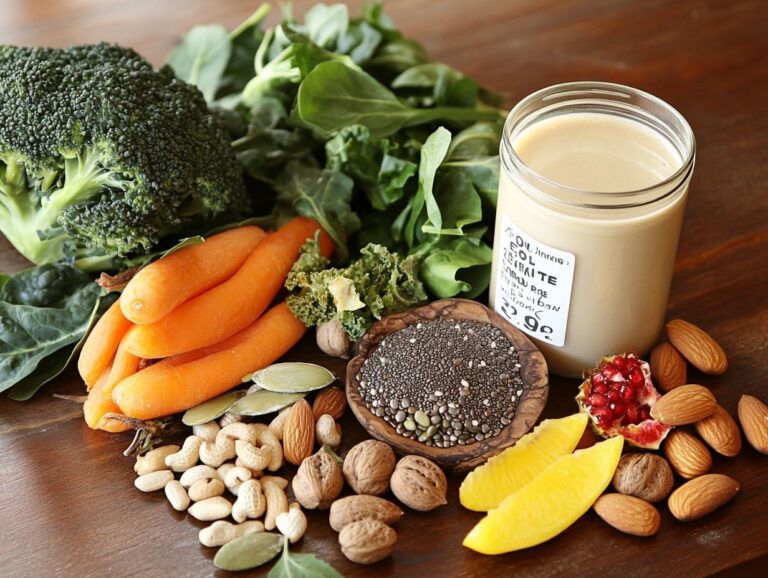In their pursuit of optimal nutrition for their children, parents are increasingly turning to plant-based infant formulas. These formulas offer nourishment for infants with allergies, promote easier digestion, and support a sustainable lifestyle. This article explores the best plant-based infant formulas, their nutritional benefits, and provides guidance on how to select the most suitable formula for your child’s unique needs.
What Is Plant-Based Infant Formula?

Plant-based infant formula is a type of baby formula specifically designed for infants who cannot consume traditional cow milk or soy formulas. These formulas serve as alternatives to accommodate various dietary restrictions and preferences.
They are particularly important for infants with milk allergies, lactose intolerance, or those who need hypoallergenic formulas. Many plant-based infant formulas utilize organic ingredients, making them an appealing option for parents seeking organic baby formula.
It is crucial to seek guidance from a pediatrician when selecting a formula to ensure that the unique nutritional needs of the infant are met.
Why Choose Plant-Based Infant Formula for Your Baby?
Choosing the right baby formula can be challenging, but plant-based options are increasingly recognized for their benefits.
Plant-based infant formula is an excellent option for babies who are allergic to milk or may have difficulty digesting cow’s milk formula.
Many families choose plant-based baby formulas to ensure their baby’s nutritional needs are met without the risks associated with lactose intolerance or other adverse reactions to dairy, making these formulas suitable for gassy babies. Additionally, these specialized baby formulas can be an excellent choice for breastfed babies needing supplementation.
Consulting with a pediatrician can help you identify the best baby formula that aligns with your child’s dietary needs and preferences. Pediatrician advice is crucial when transitioning from breast milk to baby formula.
1. Allergen-Free
One of the main benefits of plant-based infant formulas is that they are free from common allergens, making them an ideal choice for children with milk allergies or sensitivities to the typical allergens found in soy or cow’s milk formulas.
These formulas utilize alternative protein sources, such as peas or rice, to minimize the likelihood of allergic reactions. Plus being dairy-free, they are often free from gluten, nuts, and eggs, which is crucial for infants with allergies or digestion issues.
The availability of hypoallergenic formulations is significant, as they are specifically designed to reduce protein sources known to trigger allergic reactions. Allergen-free plant-based infant formulas create a supportive feeding environment for caregivers, accommodating dietary restrictions while promoting optimal growth and development. These options, such as Babys Only Organic Premium Infant Formula and Neocate, are examples of hypoallergenic formulas that can be trusted by parents.
They serve as a valuable solution for parents’ concerns, allowing them to provide their children with the nutrition they need.
2. Easy to Digest
Plant-based infant formulas are generally easier to digest than traditional dairy-based formulas, making them beneficial for babies experiencing gas or those who are lactose intolerant.
These specialized formulas often contain added enzymes or probiotics that support healthy digestion, allowing infants to absorb nutrients more effectively without discomfort. Typically made with almond or oat milk, these plant-based options are easier to digest than cow’s milk or soy milk.
Many babies suffer from bloating due to common allergens found in dairy and soy, but plant-based formulas can provide a balanced alternative that reduces these occurrences. The inclusion of prebiotics further helps maintain a healthy gut flora, which is essential for an infant’s developing digestive system.
Parents may find that these formulas lead to smoother feeding experiences and less worry about gas and discomfort, contributing to the overall health and happiness of their little ones.
3. Environmentally Friendly
The best plant-based infant formulas offer significant health benefits for both children and the environment. These formulas derive nutrients from sustainable organic crops, which have a lower environmental impact compared to conventional dairy farming practices.
Plant-based nutrition promotes a sustainable future that is healthy for both babies and their surroundings. Sustainable practices involve sourcing crops that require fewer resources, such as water and land, thereby helping to preserve natural ecosystems. Brands like Aussie Bubs and Löwenzahn Organics are known for their commitment to sustainability.
Additionally, the use of plant-sourced ingredients contributes to the reduction of greenhouse gas emissions, aiding efforts to combat climate change. Many producers of plant-based formulas are committed to regenerative agriculture, which enhances soil health and biodiversity.
These environmentally friendly practices foster an ethical approach to food sourcing, allowing parents to nourish their children with products that align with their values.
What Are the Best Plant-Based Infant Formulas?

The best plant-based infant formulas cater to the diverse dietary needs of babies, including nutrient density, ease of digestion, lactose intolerance, and adherence to plant-based diets.
Notable brands that provide high-quality plant-based infant formulas include:
- Bobbie Organic Infant Formula
- Happy Baby Organic Infant Formula
- Holle Swiss-based Organic Formula
These options are available in various forms, such as:
- soy formula
- rice-based formula
- pea protein-based formula
- goat milk formula
These alternatives serve as excellent choices for parents seeking to meet their baby’s unique dietary requirements. Well-known brands include ByHeart, Kendamil, and Else Nutrition, which provide high-quality plant-based options.
1. Soy-Based Formula
Soy-based formulas are the most common type of plant-based infant formula and offer a complete nutritional profile. They are particularly suitable for babies with lactose intolerance or dairy allergies.
Soy protein serves as the primary source for these formulas, ensuring that infants receive essential nutrients while potentially reducing the risk of digestive issues. Plus being lactose-free, soy-based infant formulas are often fortified with vitamins and minerals such as calcium, vitamin D, and iron, all of which are crucial for healthy growth and development, making them an appealing alternative for parents seeking dairy substitutes.
However, there are potential disadvantages to consider, including the presence of phytoestrogens in soy, which raises concerns about their long-term hormonal effects. Additionally, some infants may be allergic to soy protein, which is another important factor for parents to take into account. For these reasons, consulting the American Academy of Pediatrics or FDA guidelines can be helpful in making an informed decision.
Thus, understanding both the benefits and drawbacks is essential for making an informed choice tailored to the child’s specific dietary needs.
2. Rice-Based Formula
Rice-based formulas are among the most hypoallergenic infant formulas available and are excellent options for babies with digestive issues and milk allergies. These formulas use rice protein as their primary source of protein, providing a safe choice that meets the nutritional needs of sensitive infants.
Made with essential nutrients, rice-based formulas are fortified with vitamins and minerals to ensure an adequate caloric intake for healthy growth. The fats and carbohydrates in these formulas typically come from vegetable oils and maltodextrin, providing the necessary energy for babies. Brands like Good Start and Enfamil are known for their rice-based baby formula options.
Their hypoallergenic nature minimizes the risk of adverse reactions, making them suitable for infants with allergies or sensitivities to cow’s milk formulas. Additionally, some brands incorporate probiotics into their rice-based formulas to support good gut health.
3. Coconut-Based Formula
Coconut-based formulas are nutritious, plant-based infant formulas that supply healthy fats and essential nutrients for infants. These formulas rely on organic ingredients to promote overall infant health and can be particularly beneficial for babies with digestive issues, as they are generally gentle on the stomach.
Unlike many traditional formulas that heavily rely on soy or dairy, coconut-based infant formulas offer a balanced profile of medium-chain triglycerides (MCTs). MCTs are easily digestible and can provide a quick source of energy, making them ideal for sensitive infants whose digestive systems are still developing.
Plus healthy fats, coconut infant formulas are rich in vitamins, minerals, and antioxidants that support an infant’s growth and development. Parents often find that coconut-based formulas are more appealing to picky eaters, which can facilitate the transition to solid foods later on.
This option holds a unique position in the infant formula market, providing a distinct alternative to other plant-based options that may not offer the same level of nutrition and digestive comfort. Coconut-based formulas are particularly beneficial for babies with digestive issues, ensuring they receive the necessary nutrients while avoiding common allergens.
4. Almond-Based Formula
Almond-based formulas provide a nutritious plant-based alternative for infants, offering a rich source of vitamins and healthy fats that are essential for their growth and development. These formulas often prioritize the use of organic ingredients, catering to parents’ desire for high-quality nutrition for their babies.
With a well-balanced nutritional profile, almond-based alternatives deliver essential vitamins, such as vitamin E, which supports healthy skin and immune function. Additionally, they are rich in monounsaturated fats, promoting overall heart health.
Parents can feel confident knowing that many brands source their almonds from sustainable farms, ensuring both ethical practices and superior quality. These formulas typically contain added nutrients like calcium and iron, further enhancing their suitability for growing infants. Examples of such brands include Sprout Organic and Similac, which prioritize high-quality, organic ingredients.
This combination not only satisfies the dietary needs of babies but also aligns with the increasing demand for plant-based options in infant nutrition.
5. Oat-Based Formula

Oat-based formulas, much like soy formulas and goat milk formulas, are gaining popularity among parents who seek plant-based nutrition for their infants, as they provide a rich source of carbohydrates and fiber that promotes healthy digestion.
These formulas are often preferred for their gentle composition, which supports infants with digestive issues, such as gassy babies, without compromising on nutrition. They are known to offer essential vitamins and minerals that contribute to overall growth and development during the crucial early months of life.
The soluble fiber found in oats helps regulate bowel movements, making these formulas ideal for infants who may be prone to constipation or other digestive discomforts.
Additionally, oat-based options cater to a variety of dietary needs, including those of vegan families and babies with allergies to dairy or soy, or those with lactose intolerance. As awareness of plant-based diets increases, parents are likely to recognize the numerous benefits these formulations can provide for their child’s health.
What Are the Nutritional Requirements for Infants?
Parents need to understand the proper nutritional requirements of infants to select the best baby formulas that ensure adequate nutrition for their growth and development.
Infants require a balanced diet that includes sufficient levels of protein, carbohydrates, fats, vitamins, and minerals, as their bodies are growing rapidly. This understanding is crucial for those who are feeding baby with either breastfed babies or choosing the best baby formula.
1. Protein
Protein is a vital component of infant nutrition, playing a crucial role in muscle growth and overall body function. It’s especially important in plant-based formula, where protein sources can vary.
When selecting the best baby formula, it is essential to ensure that it provides adequate protein levels, particularly for infants on plant-based formulas, which may vary in their protein sources and content.
Proper protein intake is critical during the first year of life, with guidelines recommending that infants require approximately 1.5 grams of protein per kilogram of body weight each day.
Standard infant formulas typically derive their protein from cow’s milk, while those designed for sensitive tummies may use hydrolyzed proteins or amino acid blends.
Plant-based formulas generally incorporate proteins from sources such as soy and pea, allowing parents to choose options that align with their dietary preferences.
Regardless of the source, it is important to ensure that protein intake meets infants’ nutritional needs to support healthy development and long-term well-being.
2. Carbohydrates
Carbohydrates serve as the primary source of energy for infants, making them an essential component of infant nutrition that should be prioritized in the selection of baby formulas. It is crucial for parents to choose formulas that contain easily digestible carbohydrates to meet their babies’ energy needs for growth and development.
These carbohydrates can be found in both simple and complex forms, such as lactose, sucrose, and corn syrup solids, each offering unique benefits.
Lactose, the most common carbohydrate in breast milk, plays a vital role in calcium absorption and the development of healthy gut flora, which is essential for a baby’s immune system. Formulas that contain complex carbohydrates provide a gradual release of energy, helping to maintain steady energy levels throughout the day, which can positively influence an infant’s mood and activity levels.
Therefore, understanding the role of carbohydrates in infant formulas not only aids in selecting the right nutritional profile but also ensures that little ones thrive during their critical developmental years.
3. Fats
Fats play an essential role in infant nutrition, providing not only energy but also supporting brain development and the absorption of fat-soluble vitamins.
It is important for a baby’s diet to include healthy fats, which should be present in the best baby formulas. There are two types of healthy fats: saturated and unsaturated, each serving a unique purpose in an infant’s growth.
Saturated fats, found in medium-chain triglycerides (MCTs) from sources such as coconut oil and dairy, provide an easily accessible source of energy for infants. On the other hand, unsaturated fats, primarily derived from fish oil and vegetable oils, are crucial for cognitive function and overall health. Parents often consider organic baby formula options to ensure these fats are derived from organic ingredients.
Many infant formulas incorporate these healthy fats to replicate the nutritional composition of breast milk, ensuring that infants receive the necessary building blocks for their developing bodies and minds.
4. Vitamins and Minerals

Vitamins and minerals are essential nutrients that play a significant role in supporting infants’ overall health and development, making them a crucial aspect of infant nutrition.
When evaluating the best baby formula, parents should prioritize those that contain a balanced array of vitamins and minerals to ensure their babies receive comprehensive nourishment.
Key vitamins, such as Vitamin D, are vital for bone development and immune function, while important minerals like iron are critical for cognitive development.
B vitamins contribute to energy metabolism and healthy brain function, and Vitamin A aids in vision and cell growth.
Parents should seek formulas fortified with these nutrients to help bridge any dietary gaps, as a balanced intake not only promotes optimal growth but also supports the metabolic processes necessary for overall health.
Consulting with a pediatrician can further guide parents in selecting the most suitable formula, ensuring their little ones thrive during this crucial early stage.
How to Choose the Right Plant-Based Infant Formula for Your Baby?
The appropriate plant-based infant formula for babies can vary from one child to another, depending on their individual nutritional needs, any allergies they may have, and the recommendations of their pediatrician.
Parents should evaluate the different baby formula options by considering their ingredients, certifications, and how effectively they meet their baby’s specific dietary requirements.
1. Consult with a Pediatrician
Parents should consult a pediatrician to receive the best advice when selecting a plant-based infant formula. Pediatricians can provide personalized guidance, helping parents ensure that their baby receives the proper nutrition based on the child’s health and growth needs, especially when dealing with milk allergies or other sensitivities.
This includes recommending the most suitable baby formula options, which may even encompass specialized formulas for infants with allergies or other specific health concerns. By considering the baby’s age, weight, and any particular medical issues, pediatricians assist parents in navigating the often overwhelming array of products available in the market.
This support helps parents create an optimal environment for their child while also allowing them to feel more in control of their baby’s nutritional choices. With infant feeding options constantly evolving, having a healthcare professional involved alleviates stress for families, enabling them to focus on the joys of parenthood.
2. Read Labels and Ingredients Carefully
Carefully reading labels and ingredients helps parents choose a plant-based infant formula by ensuring they understand the nutritional content and whether it meets their baby’s specific needs. This practice enables parents to identify hypoallergenic formulas and confirm that ingredients important to them, such as organic and plant-based components, are included or excluded according to their preferences. Popular formula brands like Bobbie Organic Infant Formula, Babys Only Organic Premium Infant Formula, and Holle Swiss-based Organic Formula offer various options.
When examining the label, parents should look for specific nutrients like DHA and ARA, which are essential for brain development. Formulas enriched with vitamins B12 and D are also crucial for growth and immunity.
Parents should avoid additives like palm oil, corn syrup solids, and fillers that lack nutritional value. Certifications such as USDA Organic and Non-GMO provide reassurance that the formula meets higher quality standards, ensuring purity and health.
By staying vigilant, parents can make informed decisions that align with their child’s health needs and their family values. Consultations with pediatrician advice and considering reputable formula brands can further guide these decisions.
3. Consider Your Baby’s Allergies and Sensitivities
When choosing a plant-based infant formula, it is crucial to consider the baby’s allergies and sensitivities, as these factors can significantly influence the selection of the most appropriate formula.
The more parents understand how certain ingredients may trigger digestive issues or allergic reactions, the easier it will be to narrow down the options for specialized baby formulas, such as those offered by Neocate and Good Start, that are safe for their child.
Monitoring for signs of allergic reactions, such as rashes, gastrointestinal discomfort, or excessive fussiness, is an essential part of this process. Parents should collaborate with healthcare professionals to accurately assess their infant’s dietary needs.
Specialized formulas, such as lactose-free infant milk or hypoallergenic options, can be particularly beneficial in ensuring that babies receive the necessary nutrition without the risk of allergic reactions.
It is advisable to introduce any new formula gradually while closely monitoring the infant to ensure that any allergic or intolerant sensitivities are quickly identified.
By addressing nutritional needs with careful consideration, parents can help provide a healthy start for their baby while minimizing discomfort associated with allergenic foods. This includes selecting hypoallergenic formulas or specific formulas for gassy babies when necessary.
4. Look for Added Nutrients
Nutritious additives play a crucial role in enhancing the nutritional profile of the best plant-based infant formulas. These formulas, like those from Enfamil, Similac, and Kendamil, include essential nutrients such as vitamins, minerals, and fatty acids, which are vital for an infant’s growth and development.
The added nutrients ensure that the selected best baby formula meets or exceeds the standards of top baby formula options. Critical nutrients like DHA and ARA are particularly important for supporting brain development and cognitive function. For breastfed babies who may need supplementation, these formulas can complement nutritional needs effectively.
Additionally, vitamins such as A, C, and D contribute to immune health and bone density, while minerals like iron aid in cognitive development and help prevent anemia, which is crucial during an infant’s early formative months. Hypoallergenic formulas are available for those with milk allergies or lactose intolerance, ensuring all babies can get the nutrients they need.
Formulas like Organic Infant Formula, cow milk formula, and plant-based formula options from brands such as Earth’s Best provide a combination of these essential nutrients, making them excellent choices for promoting healthy growth. For those considering organic baby formula, Bobbie Organic Infant Formula and Babys Only Organic Premium Infant Formula are popular choices. Parents seeking specialized baby formulas for digestion issues or gassy babies can consult pediatrician advice for the most suitable options.
By choosing these nutrient-rich formulas, parents can help ensure their infant’s overall wellness and development during the early stages of life. Trusted formula brands like Similac, Enfamil, and Good Start offer a variety of options, including soy formulas and goat milk formula, catering to different dietary preferences and needs.





